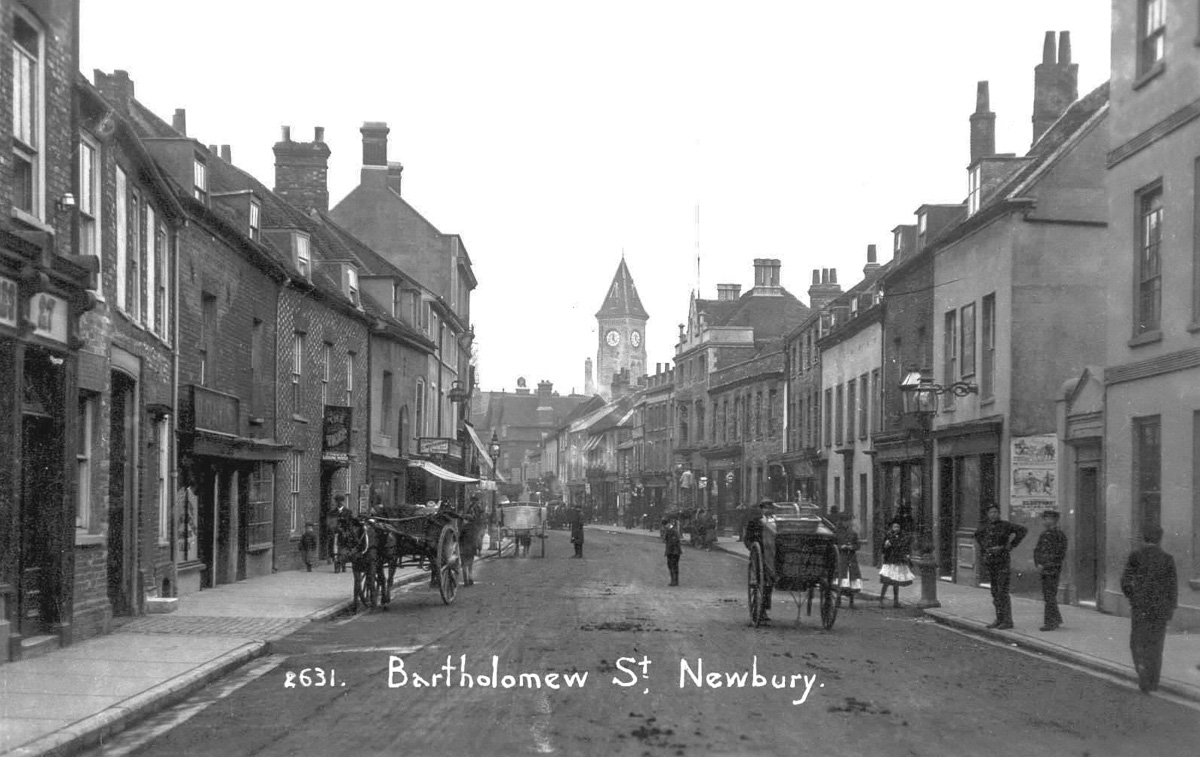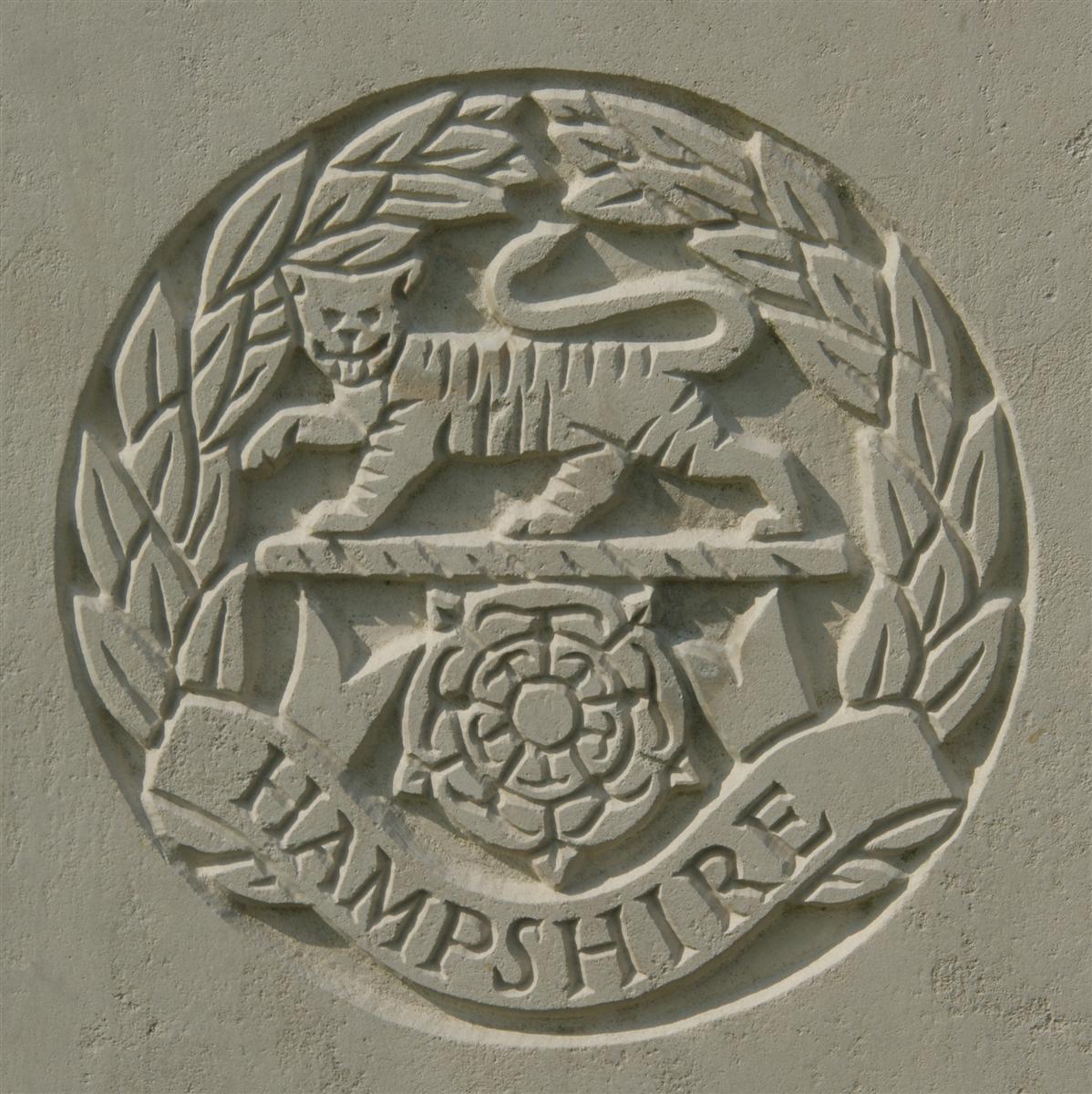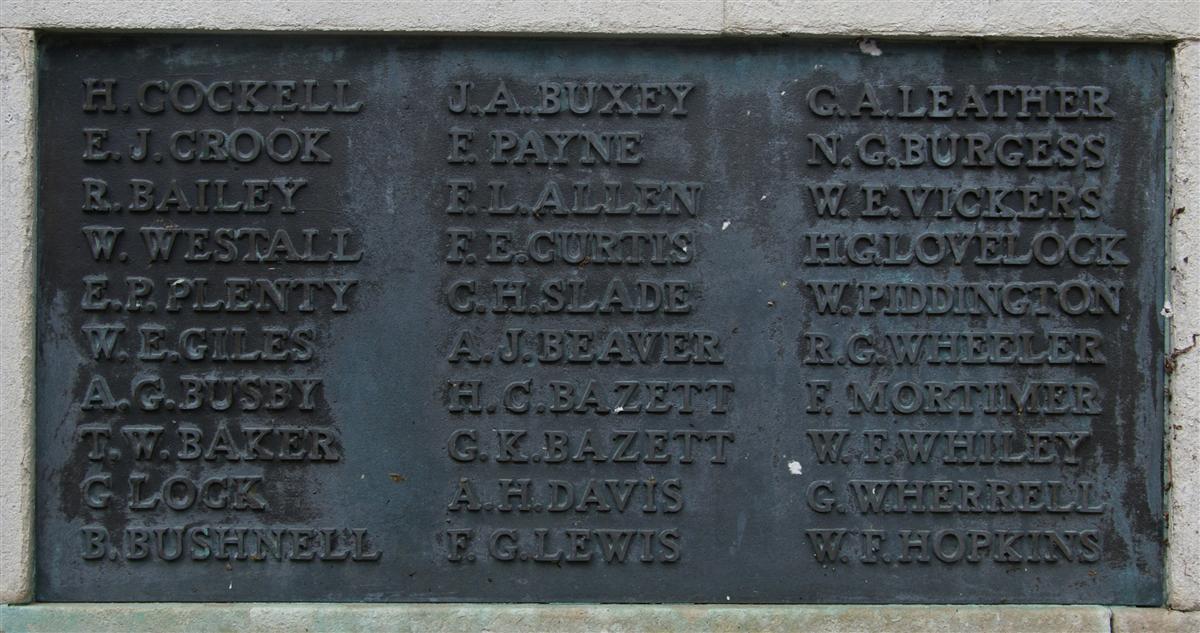Frederick Payne
Private 357255 Frederick Payne, 2nd Battalion, Hampshire Regiment
Frederick was born in Newbury in 1899, the second and youngest son of Henry Payne (or Pain) and his wife Martha Jane née Perrett. Although there were only two sons they did not lack for feminine company because they had five sisters. The siblings were: Henry Lewin (born 1891), Frances Georgina (1893), Lettice Louise (1895), Frederick (1899), Florence Amelia (1901), Elsie Maude (1903) and Kathleen Doris (1910).

Bartholomew Street in the 1900s - at the time when the Paynes were living at the Falkland Arms (the building with the gas lamp on the right). |
At the time of Frederick’s birth his father was landlord of the Falkland Arms, a public house at 124 Bartholomew Street. This was not one of the grand inns of the town and catered for the poorer end of society. The trade at such pubs was often insufficient to support a family so it is no surprise to see Frederick’s father, Henry, listed as a carpenter in the family’s 1901 census entry, despite being the licensee of the pub, which was also the family home and probably Frederick’s place of birth. In reality, it was often the landlord’s wife who took on the bulk of the licensee’s duties while her husband was at work elsewhere.
Following his birth Frederick was baptised on 21 May 1899 at St Nicolas’ Church a short distance up Bartholomew Street from the Falkland Arms.
On 7 December 1903 a man named Symes, a lodger at of the Church Army Shelter in Newbury was examined by a doctor, who diagnosed a case of small-pox. By this date inoculation had largely suppressed the disease so an outbreak was treated as an emergency. A second case on 22nd December allowed the authorities to determine a common factor – both men had been at the Falkland Arms. Frederick’s father, Henry, had been sick for some time when he presided over a meeting of the pub’s slate club on 19th December, but the doctor attending him had not diagnosed an infectious disease; a doctor sent by the authorities disagreed and diagnosed varioloid small pox – Frederick was the focal point of the outbreak. Over the coming days twelve more cases were identified, all but one attendees of the slate club meeting or their family. Presumably Symes had brought the disease to town, passed it on to Henry, who then infected several of the slate club members. Prompt action by the authorities isolated those infected in the Isolation Hospital on Wash Common, inoculated anyone who was in contact with them and disinfected their homes and workplaces. The outbreak was brought under control, but Symes and three others died. At the time Frederick was only four; it is likely that he had been inoculated as an infant and thus did not contract this terrible disease.
As a result, the family lost its income for a period, not only because Henry was in quarantine and unable to work but also because the pub was closed by the authorities until it was clear that Henry had recovered and there was no risk of further infections. This was unfortunate timing because the Annual Licencing Session for the Borough of Newbury took place while it was closed. The magistrates presiding decided that the closure demonstrated that the Falkland Arms was not needed and decided not to renew its license. Henry and the brewery (H & G Simonds of Reading) appealed the decision and won, so the Falkland Arms survived for another 60 years. It was eventually demolished to make way for a new bus station which, in turn, was replaced by the Kennet Centre multi-story car park.

The badge of the Hampshire Regiment as used on CWGC headstones |
When the war began in 1914 Frederick was only fifteen, by the time he was old enough to enlist any aspect of choice had been removed – he was conscripted in the spring of 1917 as soon as he turned eighteen. At this date he would have entered the army as a trainee anticipating a transfer to a frontline unit some time after his nineteenth birthday because the army had a policy of not sending men/boys to the front until they were that age. However, there was a manpower crisis in the spring of 1918 following the massive German attacks from 21 March onwards. The Government lowered the age limit to 18½ in order to meet the Army’s desperate call for more troops. This was very close to Frederick’s 19th birthday (the exact date is unknown) he may have arrived in France shortly before the initial German attack, if not he was rushed across in the days that followed. He was posted to the 2nd Battalion of the Hampshire Regiment (88th Brigade, 29th Division).
The German’s initial attack (Operation Michael) was along the Somme front, as that ground to a halt they switched their attention to the Franco-Belgian border launching an attack on 9 April (Operation Georgette – also known as the Battle of the Lys). At the time the 2nd Hampshire Battalion was away from the front in a rest period, it was 11 April before they faced the advancing enemy near the village of La Crêche where, the previous evening, they had hurriedly created a defensive line along the Bailleul/Armentieres road. Despite being heavily shelled the battalion repelled the German advance with a combination of rifle and Lewis gun fire. That evening, as the battalion held their makeshift line, the battered 34th Division withdrew through the position. Casualties for the day were 15 killed, 48 wounded, 27 missing, 2 sick and 1 died of wounds.
It is a sad fact that the men most at risk were the latest arrivals, the men who were that little bit slower to react to the sound of an incoming shell, the men whose survival instincts had yet to be honed to life in the line. Frederick, who may well have been under fire for the first time that day was one of the 15 to lose their lives, killed in action.
The news reached Newbury a few weeks later:
Frederick's name on Newbury War Memorial. (upper middle)
Newbury Weekly News, 16 May 1918 – Deaths
PAYNE – Killed in action April 11th, 1918, in France, Pte Frederick Payne, 357,255, 2nd Hants Regt, the dearly loved and youngest son of H and M Payne of King’s-road, Newbury, aged 19 years.
No heart can think, no tongue can tell,

What he endured while he was there.
But, when God thought it best,
He took him to a place of rest.
Father, Mother, Brother and Sisters
He has no known grave; his name is remembered on panel 6 of the Pleogsteert Memorial to the missing.
Locally he is remembered on tablet 9 of the Newbury Town Memorial.

Find a memorial :
| Died this day: | |
| 02 March 1943 | |
| K F Bartholomew | |
| Thatcham |

Like this site? Show your appreciation through a donation to a great charity.